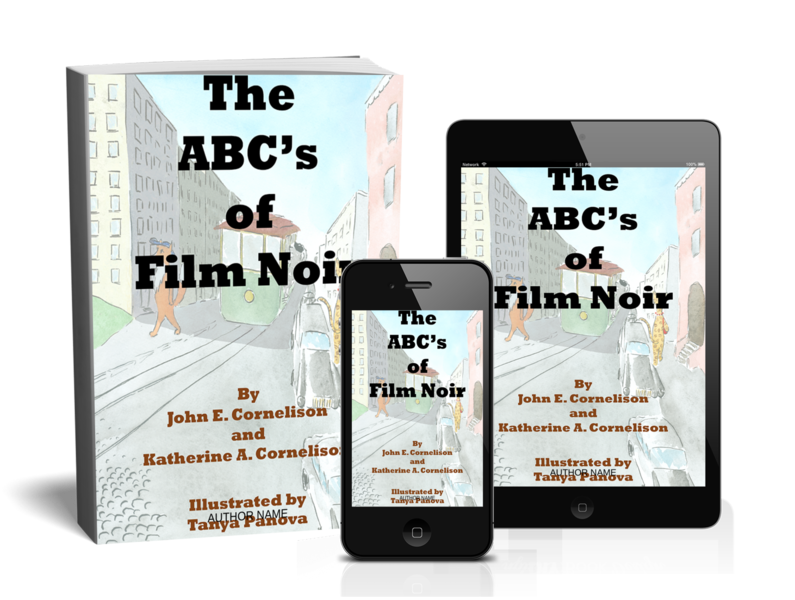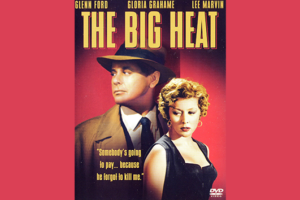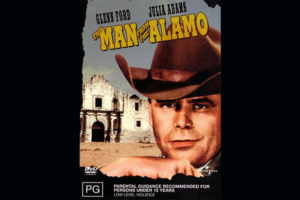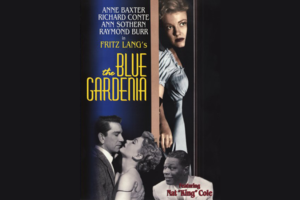
It’s much better to have good looks than brains because most of the men I know can see much better than they can think.


Today on Classic Movie Review, we are taking on Film Noir Human Desire (1954). This movie has an earlier French version, La Bete Humaine (1938).
Before we get going, I want to shout out to Thunderstruck for his comment on Lady in the Lake (1946). It was a sore-tailed cat. I’m working on that English language thing. Also, to David for the email about the passing of Sidney Poitier. I plan on pushing In the Heat of the Night (1967) up the to-do list as an homage to Poitier. Keep sending those emails and comments. They are much appreciated.
When I find a Film Noir that stars Gloria Grahame, Glenn Ford, and Brodrick Crawford, I expect it to be good. Add in direction by Fritz Lang and the original story by Emile Zola, I expect it to be good. Not so much with this film. It’s okay, and I always enjoy seeing Gloria Grahame. I’m not saying I wouldn’t watch it, but it could be a lot better.
This movie has a 7.1 on iMDB.com[1]. On Rottentomatoes.com, the film has a 59 percent score on the Tomatometer and 71 percent audience approval[2]. New York Times film critic Bosley Crowther fairly hated this film and said in an August 7, 1954 review:
“Among the assorted troubles with Columbia’s “Human Desire,” which was deposited with eight acts of vaudeville at the Palace yesterday, is that there isn’t a single character in it for whom it builds up the slightest sympathy—and there isn’t a great deal else in it for which you’re likely to have the least regard. Gloria Grahame as a no-good married woman who spreads her favors as indifferently as she spreads her bed is as wholly devoid of fascination as a lush on a stool in a saloon. Broderick Crawford as her wildly jealous husband who kills a man because of her is dreary, too. And Glenn Ford as a locomotive driver who briefly cottons to the dame is just plain dull.”[3]
On my ever-changing list of All Film Noir Movies, I am slotting today’s film at number 121.
Actors – Human Desire (1954)
Returning
Glenn Ford played Jeff Warren, a returning Korean Conflict veteran. Ford was first covered in the dark drama Blackboard Jungle (1955).
Gloria Grahame played Vicki Buckley, a mistreated woman forced to use all she has as a defense. Grahame was first covered in It’s A Wonderful Life (1946).
New
Broderick Crawford played Carl Buckley. Crawford was born in 1911 in Philadelphia, the city of brotherly love and sisterly affection. His parents and grandparents were vaudevillians. So, he clearly went to work with his parents.
Crawford was accepted to Harvard College but left after three weeks to work as a stevedore. He eventually returned to vaudeville and began working on radio. In 1937, Crawford had a Broadway hit playing Lenny in ‘Of Mice and Men.’
Crawford moved to Hollywood and obtained a role in Woman Chases Man (1937). A burly and tough-looking man, Crawford was confined to supporting roles such as in Larceny, Inc. (1942). Crawford joined the U.S. Army Air Force and was assigned to work as a radio announcer. Following World War II, one film he was in was Black Angel (1946).
In 1949, Crawford starred in his best-known role, Governor Willie Stark, in All the King’s Men (1949). He won the Best Actor in a Leading Role Oscar for this role. His next film was a hilarious comedy, Born Yesterday (1950), with Judy Holliday and William Holden.
Crawford’s career evolved into him mainly playing tough guys in Film Noirs and westerns. He was great in these roles. Some of these movies are Last of the Comanches (1953), a western remake of Sahara (1943), Film Noirs Human Desire (1954), Down Three Dark Streets (1954), New York Confidential (1955), Big House, U.S.A. (1955), and western The Fastest Gun Alive (1956) with Glenn Ford.
Crawford had a long-running television series ‘Highway Patrol’ 1955-1959. He continued to make movies and appear on television until 1982. Crawford died in 1986.
Kathleen Case played Ford’s neglected girlfriend, Ellen Simmons. Case was born in Pennsylvania in 1933. Case attended the Ursuline Academy in Pittsburgh and debuted on the stage at age 11. Case worked as a dancer before signing a contract with Columbia.
Case had her first uncredited film role in 1951. Her best-known films include Flight Nurse (1953), Human Desire (1954), Running Wild (1955), and Calling Homicide (1956). Case had a successful television career that lasted until 1961. Case died in 1979 at the young age of 45.
Edgar Buchanan played Ford’s co-worker, landlord, and jilted girlfriend’s father, Alec Simmons. Buchanan was born in Missouri in 1903. When Buchanan was seven years old, he moved with his family to Oregon. Like his father, Buchanan became a dentist and practiced in Oregon from 1929 to 1937. He then moved to California.
In California, Buchanan joined the Pasadena Community Playhouse. At the age of 36, he gave up dentistry for acting. During his long career, Buchanan was in over 100 films and was prolific on television. His first film role was in 1939, and some of his better-known films include The Sea Hawk (1940), Texas (1941), The Bandit of Sherwood Forest (1946), Framed (1947), The Man from Colorado (1948), The Great Missouri Raid (1951), Rawhide (1951), Shane (1953), Human Desire (1954), Destry (1954), don’t watch this movie, watch the Jimmy Stewart version, The Sheepman (1958), Cimarron (1960), Donovan’s Reef (1963), McLintock! (1963), The Rounders (1965), and his last film, Benji (1974).
That would be enough of a career for anyone, but Buchanan’s television career is just as impressive. Buchanan is known to my generation as lazy Uncle Joe from the Shady Rest Hotel on “Petticoat Junction,” 1963-1970. The character of Uncle Joe also appeared on “Green Acres” 1965-1969 and “The Beverly Hillbillies” in 1968. Buchanan remained popular on television until the end of his career. He died in 1979.
Dan Seymour had a small uncredited role as bartender Duggan. Seymour was born in Chicago in 1915. He attended high school in Chicago and graduated from the University of Chicago. While in school, Seymour acted and emceed. Seymour moved to Hollywood and had a bit part in Bombs Over Burma (1942), starring Anna May Wong. He also had a bit part in Casablanca (1942).
He was very successful play dark, heavy, mostly bad guys in film and television. His best-known films include To Have and Have Not (1944), Cloak and Dagger (1946), Key Largo (1948), Abbott and Costello in the Foreign Legion (1950), Rancho Notorious (1952), Mara Maru (1952), The Big Heat (1953), Human Desire (1954), and Escape to Witch Mountain (1975).
Seymour was very successful on television. To me, he is best known for playing seven different roles on “Perry Mason” 1957-1965 and for playing The Maharajah on “Batman” 1966. Seymour stopped acting in 1978 and died in 1993.
Story – Human Desire (1954)
The movie begins with a train rolling through the countryside as the credits roll. Jeff Warren (Glenn Ford) is the train’s engineer, and he is very laid back. He casually signals his co-worker Alec Simmons (Edgar Buchanan) for a light. Alec is happy that they have brought the train in on time.
People around the depot welcome Jeff back from the Korean Conflict. The engine is turned around and put in the maintenance barn. Jeff and Alec go to the yard office. The tough yardmaster gives him a begrudging welcome back. The clerk tells Jeff that he will have to make another run in the morning and deadhead back on another train. Jeff says he is staying at Alec’s house.
They run into Carl Buckley (Broderick Crawford) as they walk across the yard. Carl has moved up from engineer to assistant yard manager in the three years Jeff has been gone. Carl mentions that he is now married. Carl is called to the yardmaster’s office.
At Alec’s home, Jeff is greeted by Mrs. Simmons (Diane DeLaire) and later by the couple’s daughter Ellen Simmons (Kathleen Case). Jeff comments on how she is grown while he has been gone. Ellen takes Jeff to his room. He has brought Ellen a silk kimono from Tokyo. It is clear that they are interested in each other and plan to date.
Carl goes home to his small house located near the railroads. His wife, Vicki Buckley (Gloria Grahame), is admiring her leg. She seems to be bored as a housewife. Carl had gotten into an argument with the yardmaster and was fired. Vicki wants to try a new town, but Carl is not having it. He rebuffs Vicki for offering to get a job.
Carl asks Vicki to speak to a male friend of hers, John Owens (Grandon Rhodes), a big shipper who could help Carl get his job back. Vicki’s mother used to be Owens’ housekeeper. She is against the idea of talking to Owens. Carl pouts and begins drinking. Vicki agrees to call Owens.
In the morning, Carl and Vicki ride to a larger town on Jeff’s train. Vicki is very distant. She has arranged to use her friend Jean’s (Peggy Maley) apartment. Carl waits at the apartment while Vicki goes to see Owens. She is known to Owens’ secretary.
Owens is happy to see Vicki and does elevator eyes before giving her a pat. Jean is getting dressed as Carl waits impatiently. Vicki is very late coming back from the meeting. Jean leaves for a date before Vicki makes it back. Vicki tells Carl he has his job back because Owens made the call.
Carl tries to embrace Vicki, but she quickly pulls away, saying she is hot and tired. Carl starts questioning Vicki about being gone for five hours. She says they went out for a drink. Carl becomes increasingly suspicious and aggressive. Vicki mocks Carl and tries to get in the shower. When Carl grabs her, she says she is tired of being pawed by all of you. Carl begins slapping Vicki and accuses her of cheating. She confesses under threat of being beaten. He drags her into the main room and forces her to write a message to Owens.
In the train station, a messenger is paging John Owens. Owens gets the message while Carl and Vicki wait by the phone bank. The message Vicki was forced to write says her husband is staying in town and she will come to his compartment after the train leaves the station. Carl is heavy-handed as he leads Vicki to the train. Having finished his run, Jeff also boards the train to deadhead back to his home.
Carl and Vicki wait in their compartment. Carl forces her to go to Owens’ room. When the door is opened, Carl forces Vicki inside. It is not shown, but Carl kills Owens with a knife and then robs him. He takes the note that Vicki wrote as well. She is plastered against the wall in terror.
When they think the coast is clear, Carl and Vicki head towards their cabin. They are stopped when they see Jeff on the landing between the two cars taking a smoke break. They are forced back the other way and then have to hide in the deadman’s cabin when a conductor comes by.
Carl orders Vicki to get Jeff out of the way so Carl can make it back to their compartment. He says he doesn’t care how. Vicki puts on lipstick as she heads back. Vicki makes small talk with Jeff, and they decide to go to the club car for a drink. She pretends to have something in her eye to draw him close.
Carl heads back to his compartment. Jeff tells Vicki that the club car is close, and they pick a cabin where they can have a smoke. Finally, Jeff and Vicki get kissy-faced. She leaves in a hurry. When she returns to her cabin, Carl is standing in the dark with his knife.
The train makes it back home, where Carl and Vicki try to get off without running into anyone. They bump straight into Jeff. Carl introduces his wife, while Vicki and Jeff act weird.
Back at his house, Carl burns his bloody clothes. Vicki is in a strange mood and questions Carl about robbing Owens. She tries to find the note, but Carl keeps the note, keeping her trapped in the marriage.
Back at home, Ellen is trying to cozy up to Jeff. Mrs. Simmons says that Vicki used to work in the big city train station magazine shop. Alec comes in and tells everyone that they found a murder victim on the train. The police are searching the rail car.
An inquiry into the murder is held, and all the people known to be on the train at the time of the murder are called to testify. The breakman testifies that Jeff was the only one seen in the corridor near the murder. The passengers are made to stand. Although Vicki is present, Jeff lies and says he did not see any of these people in the corridor.
Carl and Vicki are in a local bar drinking. Vicki remains in a funk. Jeff sees the pair and enters the bar. The bartender, Duggan (Dan Seymour), serves the drinks as Jeff joins the couple. A stranger puts some snappy music on the jukebox and asks Vicki to dance. Carl gets into a scrape with the man. Jeff thinks Carl has had enough to drink, and he helps Vicki take the drunk home.
Carl staggers off to bed while Jeff and Vicki stand awkwardly in the living room. Vicki lays the sugar on thick, and Jeff wants to know how she is connected to the murder. She says she went to Owens’ room and found her old friend already dead. Vicki says that Carl didn’t know because he would go crazy if he knew she was visiting another man. Vicki mentions the abuse she has suffered at the hands of Carl. Jeff is trying to understand her actions until she reveals the bruises on her body and falls into Jeff’s arms.
Jeff is happy because of his new friend. Carl is drinking more as his relationship with Vicki sours. She won’t look at him or talk to him. When he touches her, she pushes him away. The idea of the murder is horrifying her. She wants the note destroyed, and he goes into a rage. Carl has hidden the watch and money from the crime in a heater vent. Vicki sees the location and goes there after Carl leaves the house. However, the note is somewhere else.
Vicki calls the Simmons house and sets a rendezvous with Jeff. The pair strolls through the railyard as Vicki tells of her troubles. Jeff agrees with her feelings of coldness. Vicki asks about the war and how hard it is to kill a man. He says it’s the easiest thing in the world to kill someone. The two have to hide when a workman comes through the yard. They make plans to meet at Jean’s apartment in the big city. They kiss and are illuminated by a train light.
Jeff is on his train when Ellen comes to sell him tickets to a dance. She asks about the dance and mentions that Vicki is pretty. Ellen says all of the phone calls and her intuition has let her know that Jeff and Vicki are seeing each other. Ellen leaves the dance tickets on the wall as she leaves crying. Vicki boards the train.
Alec begins to question Jeff about his actions. Jeff gets a little hostile, but Alec says in a small town, people notice things and that he should stay away from married women.
At Jean’s apartment, Jeff asks Vicki to leave Carl because they love each other. Vicki finally confesses that Carl murdered Owens. She says she was there when the murder took place. Vicki tells of the beating before she was made to write the note. Vicki says she was innocent and forced to go along by Carl. She tells about Carl having the note. Jeff thinks Vicki told him the story to make him an accomplice. When she cries, Jeff is all in for the crime.
Jeff and Alec are very tense during their work. When Jeff gets down from the train, he sees Carl walking like a zombie. The man has lost the will to live.
That night, Ellen lets Jeff know that Vicki has called. Ellen thinks there may be a chance for her and Jeff. Ellen asks Jeff about the simple things he wanted when he returned from the Army. Ellen talks about love and then storms out of the room.
Jeff goes to Vicki’s house. She says that Carl has been fired, and they will be leaving town the next day. Vicki says she will have to go with Carl as long as he has the note. Jeff says he will get the note. Vicki says this is goodbye, so Jeff can come up with the idea of murder. Just like it never occurred to her. Then she recommends an accident in the railyard.
Carl is at Duggan’s bar and is staggering drunk. Carl staggers away from the bar as Jeff stalks him down the dark streets. Carl cuts across the railyard and climbs between trains as he heads towards home. Jeff picks a large monkey wrench to use in his murder of Carl. A train passes, blocking the view of the action.
Jeff goes to Vicki and tells her that he didn’t do it and that he took the drunk Carl to the dispatcher’s office to be sobered up. Vicki is very unhappy with Jeff. Jeff says it was wrong, and he feels dirty. Vicki says Carl loved her enough to kill for her. Jeff goes into a recitation of how Vicki played him for a chump and that she was also sleeping with Owens. Vicki responses that Owens had been sexually abusing her since she was 16. The relationship continued until she married Carl and thought she was free of Owens.
Vicki says she will do anything to keep Jeff. He pulls her hands away and begins to walk out. He stops and gives her the message, which had been carried in Carl’s pocket.
The next day, Vicki gets on the train that Jeff is driving. Jeff looks at the dance ticket he got from Ellen. Carl comes into Vicki’s compartment. She didn’t know he was on the train. Carl apologizes for everything and tries to touch her. She pushes him away. Carl then offers to give her the note but finds it is gone. Carl thinks Vicki is going away with Jeff. Vicki tells Carl that Jeff walked out on her because she wanted him murdered. She confesses that she had a long-term relationship with Owens. Carl snaps and strangles Vicki.
Jeff and Alec are getting along now, and it seems the old Ellen-loving Jeff is back.
Conclusion – Human Desire (1954)
Holy cow. Jeff is guilty of accessory after the fact in Owens’ murder, lying at an official inquest, and, at least, conspiracy to murder Carl. How does he get to live happily ever after? Vicki is a classic example of a Femme Fatale, but she should be castigated for this. Ownes abused her when she was a child, Carl was brutal and uncaring, and Jeff took advantage of a bad situation.
Vicki had neither assets, resources, nor physical strength. The only tool left to her was the power of her mind and the beauty of her body to induce me to perform the actions that would keep her safe. Gloria Grahame as Vicki gave a masterclass on manipulating as a Femme Fatale.
Enough preaching. There are some interesting trivia baked into the film. When Jeff gave Ellen the kimono, he said it was from “The Teahouse of the August Moon” (1953-56), a very popular play when the film was made. Two years later, Ford started in the movie version, The Teahouse of the August Moon (1956). Also, during the fight in Duggan’s Bar, the song on the jukebox is “Put the Blame on Mame,” a song used in the Film Noir Gilda (1946), staring Ford and Rita Hayworth.
World-Famous Short Summary – Happy wife, happy life, or visa versa.
Beware the moors.
[1] https://www.imdb.com/title/tt0047101/
[2] Human Desire – Rotten Tomatoes
[3] https://www.nytimes.com/1954/08/07/archives/the-screen-human-desire-bows-on-new-palace-bill.html










Leave a Reply
Your email is safe with us.